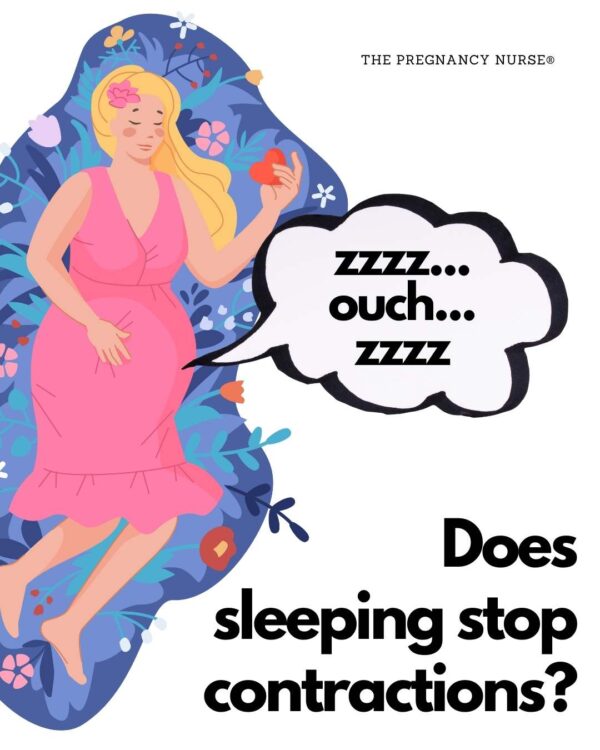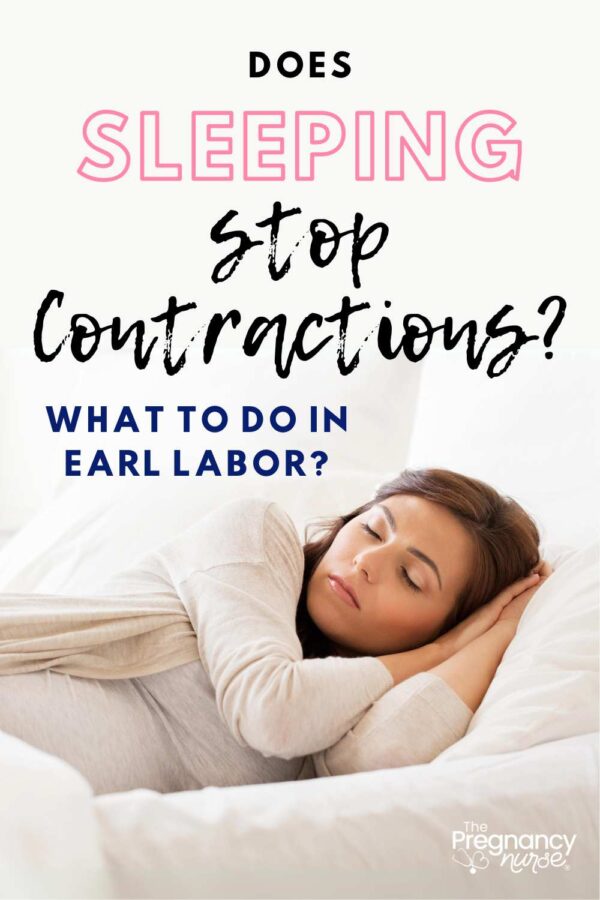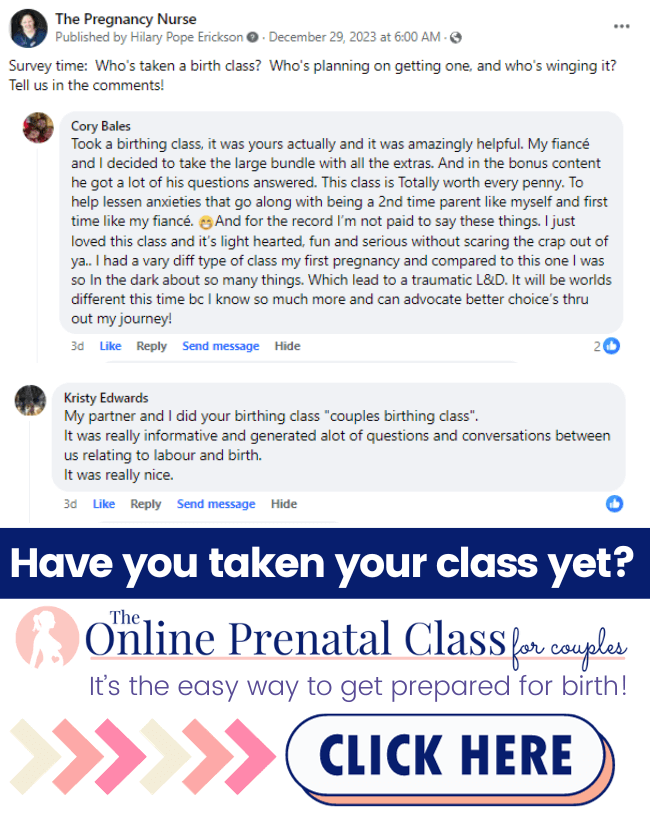📣 YOU are clearly getting prepared for pregnancy, birth & beyond — but do you wish your partner was more involved (looking for a teammate rather than just a cheerleader)? Couples love THIS! 💛🧡💚
If you go to sleep will it make your contractions stop? Today I’m going to share if sleeping is the best idea in early labor, what it can do to your contractions and how you can make the choice to sleep or stay up.
Before we get started, a quick reminder the advice in this article is for people past 36 weeks of pregnancy. If you think you’re contracting frequently before then, please call your provider. You may be in preterm labor and we’d like to prevent that if possible.
If you’re ever wondering what to do in early labor I do recommend touching base with your provider (or whoever is on for them) to just discuss your personal situation, any complications, GBS status etc. — so you have a good idea of a safe plan for you!

Ok, without further fanfare….
Will Sleeping Stop Contractions
It may, but before you roll your eyes and click on let me remind you there are two types of contractions:
- Braxton Hicks/ Practice Contractions / VERY early labor contractions.
- And, actual labor contractions (once that are advancing baby into the birth canal with some pace).
Those first contractions (Braxton Hicks), while important as they can prep your uterus, soften your cervix and often “just happen” aren’t ones that you necessarily need to “keep going”.
They may stop and start. That isn’t to say that they’re not painful — they can be VERY painful. Which is why it’s so hard to tell them apart from ACTUAL contractions.
So, sleeping may stop contractions, but if it does — it means they weren’t actual labor contractions.
To sum it up: Sleeping will NOT stop labor. But it may stop contractions (that are going nowhere).
Honestly, it’s one of my favorite ways to tell if the contractions ARE actual labor. Take a nap — if they keep going, maybe you’re onto something. If they don’t — at least you got some rest.
Of course, sometimes those contractions are so painful that rest may be fitful or not come at all.
Be sure to check out my labor vs Braxton Hicks quiz!

What else can do in early labor?
So, if you’re not feeling sleepy — what else can you?
Quick note — one of my BEST tips about making your hospital birth the best it can be is to stay home as long as you can. When you go to the hospital too early we tend to intervene in cases we often don’t need to and you end-up with a “watched pot” scenario. I talk a LOT about this in The Online Prenatal Class for Couples.
If you haven’t gotten a birth class yet (or didn’t find the one you took all that helpful) – I have good news for you! In just a few hours you can be prepared for your hospital birth (seriously, under 3). Plus it’s available when you are, so you can shove in your “birth bites” whenever you have time (makes it extra easy to do with your partner).
While I totally recommend that class, my three favorite things to do in early labor are:
- Sleep — I think it helps relax your body and “fills your gas tank” for labor. Not always possible, but I’m a fan. If you’re not sleeping I don’t recommend lazing around though — keep moving.
- Cleaning — I know, I know — this is horrible of me, but the positions we have to get in to clean often help open up your pelvis and at the same time they get a task done. I 100% recommend making sure your partner is down there with you getting the tough spots to reach!
- Cooking — Once again, you can sway to some of your favorite tunes, and get some freezer meals prepped for after baby comes home.
While everyone talks about the Miles Circuit or doing lunges (both of which I think are fine) I love the productivity and diversion that these activities provide. But, you do you — the keys are to relax, and keep moving if you’re not asleep.
BTW, a couple of those are prepping you for postpartum and I can’t recommend having a postpartum plan any more — join mine here:
Why Sleep When You’re Contracting?
Like I said above it gives you energy but most of all it helps you to RELAX. Labor is so much of a mental game. When you’re tense and worried about what comes next your pelvis feels just like that. It can’t just get into the groove, relax and let that baby descend.
When our brains turn off when we sleep it’s a big win.
The problem is, a lot of people get to labor and they suddenly realize they just know very little about birth.
They regret not taking a class and they panic.
Their pelvis feels that panic. Which can delay things, increase your stress and can cause complications during labor overall. I have a whole post on what studies show about taking a birth class.
I can’t recommend getting a class that helps you understand:
- How to manage early labor at home (bonus for tips for your partner to help you out)
- Pain management options so you’re prepped for how you feel labor (not how you think you will)
- Common interventions in the hospital so you’re not caught off-guard (bypassing birth trauma)
- How to manage life after baby (so many people forget that part)
The Online Prenatal Class for Couples hits ALL of these points. Plus, it’s available 24/7 when you are and taught by a very experienced and evidence-based instructor. It really is the class people have always wanted. Join it here.

Want to do a vibe check before diving into the whole thing with me? — check out my free labor pro tips. It’s your first step toward getting in the driver’s seat of your birth.










 Alternatives to Hospital Birth Classes
Alternatives to Hospital Birth Classes
